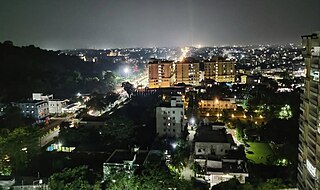
Dhanbad is the second-most populated city in the Indian state of Jharkhand after Jamshedpur and major financial hub of Jharkhand. In terms of economy Dhanbad has largest economy in the state of Jharkhand & it is often referred as 'Economic Capital of Jharkhand'. Dhanbad is also an emerging IT hub and a center for manufacturing industries. Dhanbad District is known for its cultural heritage and has several tourist attractions, making it a well-rounded destination. Dhanbad ranks as the 42nd largest city in India and is the 33rd largest million-plus urban agglomeration in India. Dhanbad Railway Division generates highest revenue in India. Dhanbad shares its land borders with Paschim Bardhaman district and Purulia district of West Bengal and Bokaro, Giridih and Jamtara districts of Jharkhand. The city is called the 'Coal Capital of India' for housing one of the largest coal mines in the country. The prestigious institute, Indian School of Mines is situated in Dhanbad. Apart from coal, it has also grown in information technology.

The Ashoka Chakra is India's highest peacetime military decoration awarded for valor, courageous action, or self-sacrifice away from the battlefield. It is the peacetime equivalent of the Param Vir Chakra (PVC) and is awarded for the "most conspicuous bravery or some daring or pre-eminent valour or self-sacrifice" other than in the face of the enemy. The decoration may be awarded either to military or civilian personnel.
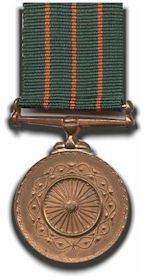
The Shaurya Chakra is an Indian military decoration awarded for valour, courageous action or self-sacrifice while not engaged in direct action with the enemy. It may be awarded to civilians as well as military personnel, sometimes posthumously. It is third in order of precedence of peacetime gallantry awards and comes after the Ashoka Chakra and the Kirti Chakra. It precedes the Yudh Seva Medal.

The Kirti Chakra is an Indian military decoration awarded for valour, courageous action or self-sacrifice away from the field of battle. It may be awarded to civilians as well as military personnel, including posthumous awards. It is the peacetime equivalent of the Maha Vir Chakra. It is second in order of precedence of peacetime gallantry awards, comes after Ashoka Chakra and before Shaurya Chakra. Before 1967, the award was known as the Ashoka Chakra, Class II.

Captain Bana SinghPVC is an Indian soldier and a recipient of the nation's highest gallantry award, the Param Vir Chakra. As a Naib Subedar in the Indian Army, he led the team that wrested control of the highest peak on the Siachen Glacier in Kashmir from Pakistani forces as part of Operation Rajiv. Following his success, India renamed the peak to Bana Post in his honour.
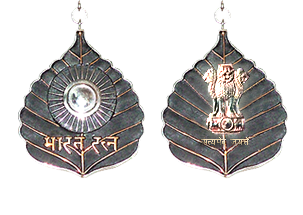
The Indian honours system is the system of awards given to individuals for a variety of services to the Republic of India. The categories of awards are as follows:

Rita Verma is an Indian politician and a member of the Bharatiya Janata Party. She is a former Minister of State of Mines and Minerals in the Indian government. She is a member of the faculty at SSLNT Women's College, Dhanbad in the subject of History.

Colonel Neelakantan Jayachandran Nair, AC, KC (popularly known as "NJ") was a highly decorated officer of the Indian Army. On 20 December 1993, while heading an advance party of the battalion, his convoy was ambushed by Naga rebels. Nair personally led the attack to break the ambush and sacrificed his life defending his men. For this act of valour, he was conferred the Ashoka Chakra.
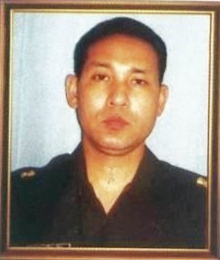
Major Laishram Jyotin Singh, AC was an Officer in the Army Medical Corps of the Indian Army, who died fighting a suicide bomber during the attack on the Indian Embassy in Kabul. Major Singh was awarded the Ashoka Chakra, the highest peacetime gallantry award in the Indian Armed Forces on 26 January, 2011.

Colonel Vasanth Venugopal, AC was an Indian Army officer. He was the commanding officer of the 9th battalion, Maratha Light Infantry. On 31 July 2007, he was Attained veergathi in action while preventing heavily armed infiltrators from crossing the India-Pakistan border at Uri, Jammu and Kashmir. As a result he was posthumously awarded the Ashoka Chakra, India's highest military decoration for peacetime gallantry.

KLVSNV Prasad Babu AC was an Indian police officer belonging to the Greyhounds special operations group of the Andhra Pradesh Police. In 2013 he was posthumously awarded the Ashoka Chakra, India's highest peacetime gallantry award, after he played a vital role in the death of nine Maoists and helped save the lives of four officers.

Havildar Rajesh Kumar, AC was a Non Commissioned Officer (NCO) of Indian Army who was awarded India's highest military decoration Ashoka Chakra.
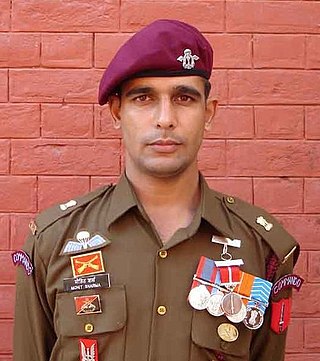
Major Mohit Sharma was an Indian Army Officer who was posthumously awarded the Ashoka Chakra, India's highest peace-time military decoration. Sharma was from the elite 1st Para SF.
R. P. Diengdoh, AC was an Indian police officer with the Meghalaya Police who was posthumously awarded India's highest peace time gallantry award Ashoka Chakra.

Naik Neeraj Kumar Singh, AC was a Non Commissioned Officer (NCO) in the Indian Army who was posthumously awarded the Ashok Chakra, the country’s highest peacetime military decoration on 26 January 2015. He had enlisted in the 13th battalion, Rajputana Rifles and was serving in the 57th battalion Rashtriya Rifles when he was killed in action.
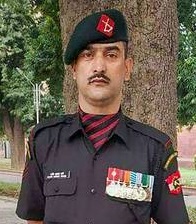
Lance Naik Nazir Ahmad Wani, AC, SM & Bar was an Indian Army soldier and a recipient of the Ashoka Chakra, India's highest peacetime military decoration. At the time of his death, he was serving with an auxiliary battalion of the army's Jammu and Kashmir Light Infantry Regiment, the 162nd Infantry Battalion of the Territorial Army. He was posthumously awarded the Ashoka Chakra for his actions during a counterterrorism operation in which his unit was attached with the 34th Rashtriya Rifles battalion. He was the first recipient of the Ashok Chakra from Jammu and Kashmir.
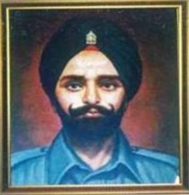
Subedar Major and Honorary Captain Sundar Singh, AC was an Indian Army officer of 4 Jammu & Kashmir Rifles who was awarded India's highest peace time military decoration Ashoka Chakra. He became the first recipient of the award from Jammu & Kashmir.
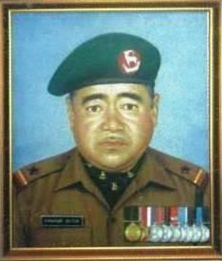
Naib Subedar Chhering Mutup, AC is a retired Junior Commissioned Officer (JCO) with the Ladakh Scouts who was awarded the Ashoka Chakra, India's highest peacetime military decoration.
Assistant Sub-inspector Babu Ram, AC (1972–2020) was a Police Officer of the Special Operations Group (SOG) Srinagar, who was awarded the highest peace time gallantry award, the Ashok Chakra.

















